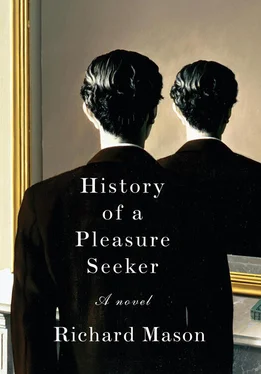While Piet Barol packed his trunk on the floor above, prevented by Mr. Blok from taking anything that had once belonged to their employer, Maarten Vermeulen-Sickerts hoisted himself over his wife. As Jacobina opened to him he almost came, but did not. He began to press into her, tenderly but surely. She opened her eyes and smiled.
If God exists, thought Maarten, then He is here.
They made love for hours. They fucked and kissed and explored their once-familiar bodies in a wonder of rediscovery. They did not hear Piet take his trunk down the stairs or pass through the entrance hall for the last time. As he walked to the station with nothing but his tailcoat, his trunk, a set of onyx studs, the clothes he had come in, and two sketchbooks full of careful drawings, they lost themselves in each other, forgave one another, and like a Phoenix from a lustful fire their friendship emerged, purged and renewed.
Piet had been sitting on the cold stone floor of the ticket hall for three hours, waiting for the first Leiden train, before they were finished. It was almost light. As they lay with their faces touching, Maarten’s arms around her shoulders, Jacobina said, “What about Louisa?”
“We shall go to your dressmaker’s this morning and order another gown, identical to the first. We will say that the original is being laundered in the country. When the new one is ready, you shall wear it as if nothing has happened. Every time you do, I will take it as an invitation to make you my own.”
“I am yours.” She kissed his shoulder. “I never wasn’t. I’m glad he’s going.”
“My darling,” said Maarten, “that young scoundrel has already gone.”
Piet Barol did not hope for comfort from his father and did not confide his transgressions or their humiliating exposure. For eleven months he had thought of Herman Barol only with gratitude for being away from him. He considered this as they shook hands in the sitting room full of furniture his mother had chosen, now woefully rearranged. It had been Nina’s teaching room and the heart of her territory. In the seven years since her death her spirit had gradually leaked from it. Now, though the pretty little chairs and discerningly chosen lamps remained, there was nothing of her left but her portrait, which still hung above the piano.
Piet resembled this painting too closely to be received with anything but suspicion by the woman with dandruff and chilblains who for many years had been his father’s housekeeper and was now his fiancée. Herman announced his imminent nuptials over breakfast as Piet was contemplating the sight of Marga’s chapped fingers on his mother’s tea service. He wished them joy. He doubted he would see his father again after sailing on the Eugénie and felt easier to know he would be cared for.
Indeed, Marga Folker cared for Herman Barol with an absorption that brooked no competitor for his affections and was glad to know that her beautiful stepson would not long remain with them. Herman did nothing whatever for himself except dress. Marga cooked and scrubbed and polished and swept and organized the ledgers that in earlier years it had been Piet’s task to fill with methodical accounts of undergraduate perfidy. She was not favored with external charms and this had left her with half a lifetime’s pent-up love. The spectacle of her showering it on Herman, who accepted it without remark, was distasteful to Piet.
He embraced them both and took a boiling kettle from the stove, to which he added icy water from the well in the backyard. The tin tub the Barols used for a bath was in its usual place behind the kitchen door. He took it upstairs. It was not long or deep enough to permit the simultaneous wetting of balls and knees and he washed as quickly as he could. He was out of practice and had added too much cold water.
The discomforts of this procedure reminded him forcefully of the circumstances of his youth and the necessity of breaking free of them. He dried himself, dressed, and went into the bedroom that had once been his parents’. Nina had brought the mattress with her from Paris at her marriage and had often stayed in bed until eleven o’clock in the morning. It was from this bed that she had dispensed to him a wisdom that ran wholly contrary to her husband’s view of life. It was here, too, that she had nursed away his childhood illnesses and sung to him arias from Bizet and Mozart — who were, she said, the only composers who understood women.
Nina Michaud had decided to marry Herman Barol at the end of a painful love affair and had imagined that she could make for herself a companion as diverting as he was steadfast. His Dutch reserve had made a marvelous contrast to the glossy seductiveness of the rakes who pursued her in Paris, and she had left behind the dangerous delights of that city with relief. It had taken her months to understand that Herman was quite unlike the man she had imagined him to be, and years to accept she could not change him. Disillusion, when it came, hit her hard. Nevertheless, she did her best to refrain from complaining of her husband to their son and slipped into doing so only by imperceptible degrees. It was when the eight-year-old Piet began to imitate Herman for her amusement that she understood she had gone too far to bother with stopping. The child caught to perfection the heavy tread of his father as he clumped to the chamber pot to relieve himself. Since Herman did so two or three times every night, at a volume to wake any sleeping soul, she and Piet found his impersonation intoxicatingly amusing. So, too, Piet’s imitation of Herman’s snoring and sudden sleep gruntings, his monotonous exhortations to errant students.
Nina had done all she could to educate her son for the life she had glimpsed, and lost. To have ended his first sally into the great world so dismally seemed to Piet a betrayal of all she had sacrificed for him. He stood in her bedroom, shivering and wishing he could confess and seek her guidance. But here too her spirit had vanished.
Christmas and New Year’s Eve came and went. Having been deprived of his fine clothes Piet attempted to stock his wardrobe from the pawnshops of Leiden; but Christmas money had allowed all but the neediest to redeem their best suits and he found only two shirts, both with stains under the arms.
As his departure neared, his dissatisfaction with himself intensified. He thought with amazement of his duplicity in Amsterdam and started to hate himself for injuring a family who had only ever shown him kindness. Egbert weighed horribly on his conscience. He had coaxed the boy into the world of human feeling and become his first friend. To have left without so much as a good-bye was dastardly. Twice he sat down to write him a letter and gave up only because he could think of nothing to say.
Piet did not know that Maarten’s evident delight in his wife had convinced even the skeptical Louisa that she was wrong. Nor did he know that Jacobina’s appearance in an identical apple-green dress, four days after Piet’s departure, had made her daughter burst into tears at breakfast and confess her hatred of him, and the true reasons for it, and beg her mother’s forgiveness.
This scene was excruciating for Jacobina but she did not shrink from the hypocrisy it required. She was extremely sharp with Louisa and rebuked her for drinking in public. Then she said, “Let us hear no more about it,” and later, in a kinder voice, “I forgive you, my darling.” As she spoke she looked at her husband, and the love in his eyes allowed her to forgive herself also.
None of the Vermeulen-Sickertses would ever forget Piet Barol, but as soon as he had left them they began to think of him much less often. It was he who could not shake himself free of them. Their shades pursued him in his dreams, and on the third day of the New Year they were joined by Nina in a ferocious nightmare. He had shared everything but his amorous adventures with his mother. Now her outraged ghost knew all and told him he had failed her.
Читать дальше












